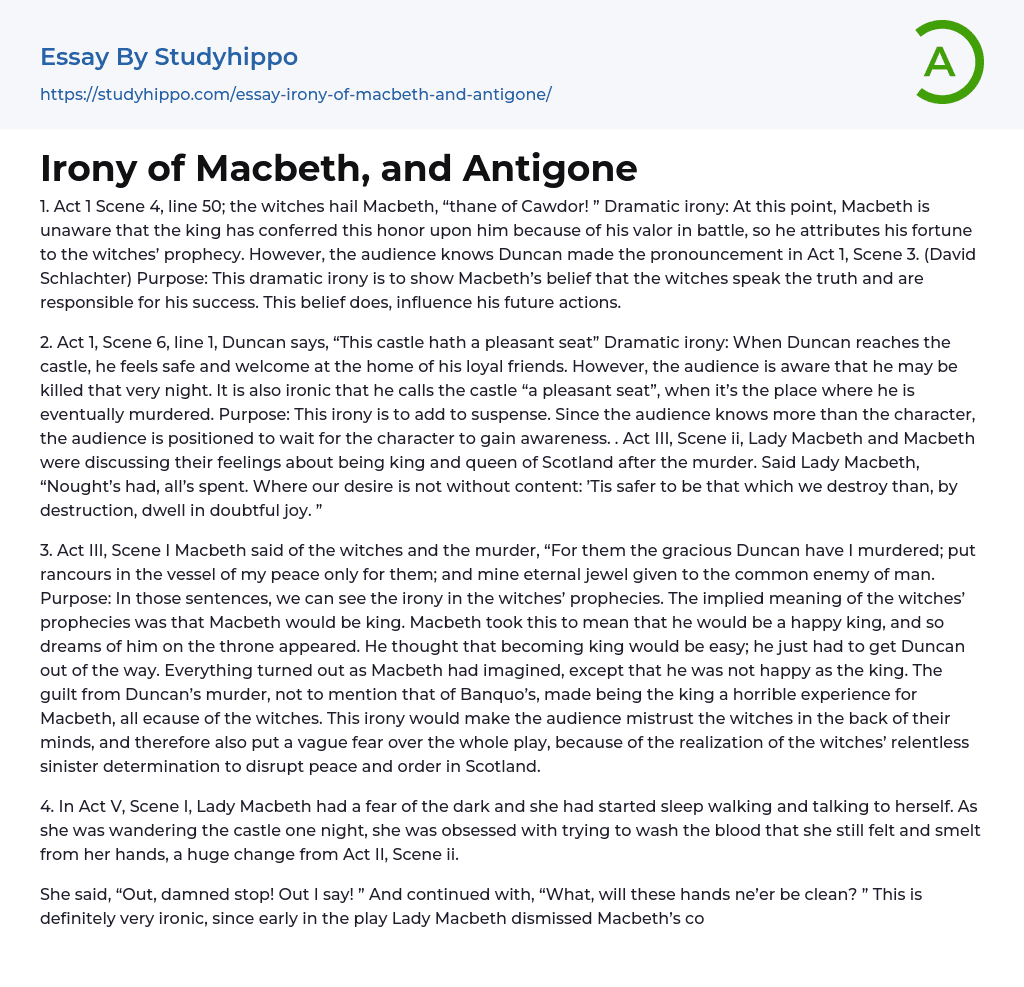In Act 1 Scene 4, line 50, the witches hail Macbeth as the "thane of Cawdor!" This creates dramatic irony because Macbeth is not yet aware that the king has given him this title due to his bravery in battle. Instead, Macbeth believes that his success is due to the witches' prophecy. However, the audience knows that Duncan declared Macbeth as the thane of Cawdor in Act 1, Scene 3. This dramatic irony serves to highlight Macbeth's belief in the witches' words and how it influences his future actions. (David Schlachter)
Duncan's admiration for the castle in Act 1, Scene 6, line 1, is expressed by stating "This castle hath a pleasant seat." This creates dramatic irony as Duncan feels safe and welcomed by his loyal friends, while the audience knows of the danger within
.... It is ironic that he describes the castle as pleasant when it ultimately becomes the location of his murder. The purpose of this irony is to heighten suspense as the audience awaits Duncan's realization of his impending fate. In Act III, Scene ii, Lady Macbeth and Macbeth discuss their feelings about becoming king and queen of Scotland after the murder. Lady Macbeth comments, "Nought’s had, all’s spent. Where our desire is not without content: ’Tis safer to be that which we destroy than dwell in doubtful joy through destruction."
3. Act III, Scene I showcases Macbeth's reflection on the witches and the murder, expressing, "For them the gracious Duncan have I murdered; put rancours in the vessel of my peace only for them; and mine eternal jewel given to the common enemy of man." The purpos
of these sentences is to highlight the irony within the witches' prophecies. While the witches' implied meaning was that Macbeth would become king, Macbeth interpreted this as a promise of happiness as king, leading to his visions of himself on the throne. However, Macbeth soon realizes that his assumption was wrong as he becomes an unhappy and burdened king due to the guilt from Duncan's murder, along with Banquo's. The witches bear responsibility for this unsettling twist of fate. This irony instills doubt in the audience's perception of the witches, creating an underlying fear throughout the play as they witness the witches' relentless and malevolent actions disrupting peace and order in Scotland.
In Act V, Scene I, Lady Macbeth developed a fear of the dark and began sleepwalking and talking to herself. While wandering the castle one night, she became fixated on trying to wash the blood off her hands that she still felt and smelled, which marked a significant contrast to her behavior in Act II, Scene ii.
In the play, Lady Macbeth exclaimed, "Out, damned spot! Out, I say!" and also wondered, "Will these hands never be clean?" This is an ironic situation as earlier in the play Lady Macbeth disregarded Macbeth's concerns without much consideration, and one would not expect her to think of them again. In Antigone 1, a simple example of verbal irony occurs when Antigone refers to Creon as "the worthy Creon" in the prologue, despite actually meaning the opposite.
In some translations, a small detail of dramatic irony may go unnoticed. When Creon is informed that Polyneices has been buried and asks, "Who has
done this?", he uses the masculine form of the Greek pronoun for "who". Some translations highlight the gender by having him inquire, "What man has done this?". However, as we are aware and he soon discovers, the culprit was not a man. It is possible that this is a case of situational irony where, as Teiresias points out, Creon has imprisoned a living person and left a deceased one unburied.
The text suggests that there are two types of irony present in the story of Creon. It could be seen as situational irony when Creon listens to the chorus's advice and decides to free Antigone and bury Polyneices. However, he does so in reverse order, possibly hoping to surprise Antigone when he lets her out. Unfortunately, this plan backfires, as she ends up being left alone in the tomb for so long that she loses hope and takes her own life.
Additionally, there is dramatic irony when Creon returns from the tomb with the bodies of Antigone and Haemon. He expresses that he has suffered enough tragedy, only to then find out about the death of his wife, an unexpected twist in the story.
- Banquo essays
- Macbeth Ambition essays
- Allegory essays
- Alliteration essays
- Comedy essays
- Comic book essays
- Drama essays
- Dystopia essays
- Fairy Tale essays
- Fantasy essays
- Fiction essays
- Ghost essays
- Gothic Fiction essays
- Gothic Literature essays
- Irony essays
- Legend essays
- Memoir essays
- Novel essays
- Poetry essays
- Satire essays
- Science Fiction essays
- Short Story essays
- The western essays
- Tragedy essays
- Witchcraft essays
- A Doll's House essays
- A Midsummer Night's Dream essays
- A raisin in the sun essays
- A Streetcar Named Desire essays
- An Inspector Calls essays
- Death of a salesman essays
- Everyman essays
- Fences essays
- Hamlet essays
- Hedda Gabler essays
- Iago essays
- King Lear essays
- Macbeth essays
- Much ado about nothing essays
- Oedipus Rex essays
- Oedipus The King essays
- Othello essays
- Pygmalion essays
- Romeo And Juliet essays
- Tartuffe essays
- The glass menagerie essays
- The Importance of Being Earnest essays
- The Merchant Of Venice essays
- The Taming of The Shrew essays
- Twelfth Night essays




